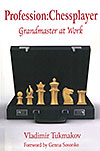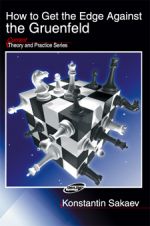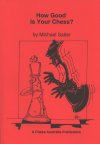Description
A brilliant book that has won many awards. Review by IM Jeremey Silman. Only a few years ago the numbers of chess reminiscences could be counted on one hand with Edward Lasker’s Chess Secrets I Learned from the Masters and Milan Vidmar’s Goldene Schachzeiten two of the best known. These classics from the past have found worthy companions in the recent releases Understanding Chess by William Lombardy and Profession: Chessplayer by Vladimir Tukmakov. Both Lombardy and Tukmakov’s book could stand alone as first rate game collections but what sets them apart as exceptional works are the author’s recollections of memorable players and events of the past. The present review will confine itself to an examination of Tukmakov’s book, first published in a Russian edition in 2010 and now available to an English speaking audience thanks to Russell Enterprises, Inc. Profession: Chessplayer is two books in one. The second half of this tome features 41 games that are carefully annotated by a player who may never have become a candidate for the World Championship, but who finished second not once but three times in Soviet Championships. Tukmakov’s becoming a Soviet Master at the age of 16 in 1962 might not seem like much by today’s standards when players become Grandmasters at an even earlier age, but at the time he was only the fourth player in the USSR to achieve this milestone. The others were Botvinnik, Bronstein and Spassky! This early success would have seemed to predict an even greater future than Tukmakov would realize. Genna Sosonko, in his thoughtful introduction, speculates as to why his good friend did not go further. Blessed with a talent for the game, strong nerves, a hard work ethic and excellent physical condition Tukmakov would seem to have had all the necessary tools to reach the Candidates, but it was never to be. Sosonko believes the explanation may be that Tukmakov was overly critical of his play to the point where it was confidence sapping. Furthermore his friendships, love of literature and life in general may have contributed to a happy existence but not necessarily the right temperament for someone wanting to storm the highest walls in chess. What this introspective temperament was good for is this book, a very thoughtful examination of a fifty-year career in chess that stretches from the heyday of the Soviet School of Chess to the breakup of the country in the early 1990s. Tukmakov also deals with the rise of the various republics to powerhouses in their own right, particularly his native Ukraine. Among the pieces of gold that are to be found in this book are the author’s impressions of greats like Bobby Fischer and Anatoly Karpov. Writing about the former, Tukmakov who faced Bobby at Buenos Aires 1970, had this to say: “Not only his play, but also his behavior on the stage was unusual. He hardly ever got up from the board, which was not common at the time. Now and then he would turn away from the game, however not so much to rest or to take a look at the positions of competitors, but only to refill his glass with milk, which he consumed in large quantities.” Tukmakov sees Karpov as a most unusual player, one who doesn’t adhere to the logical approach of Botvinnik, building up a position step by step following a strategic idea that started in the opening and triumphs in the ending. “Karpov, on the other hand, thought in chunks. There, was, of course, a general plan, but a new position with its specific features would emerge after every move and would demand a solution. Sometimes, the strongest move could be in discord with the previous plan of the game. Such contradictions would often confuse even great chessplayers. The twelfth world champion never had such doubts. He had a very unique ability of starting with a clean slate, not just a tournament or a game, but every single position. The previous ideas and variations were certainly present, but somewhere on the sidelines of this thought process and the specific features of the position after his opponent’s move were on the forefront.” Tukmakov writes often and with a certain feeling of nostalgia, for the days of Soviet chess where the tension in internal qualification events and team tournaments was sometimes overwhelming. Imagine riding a crowded escalator where only a few people reached the top floor. That was the situation in the Soviet Union where players butted heads in a never-ending series of qualification tournaments and one ill-timed loss could result in a wait of several years for a second chance. The author contrasts this pressure cooker atmosphere with the never ending series of events today’s professionals play in which the prize money is infinitely better but the stakes seem less serious. Tukmakov is an insightful observer of how top-level player’s age. Writing of his own career as he approached age 40, he writes: “In Dortmund, as well as in Leningrad and in Sochi, I played pretty well, but clearly I did not score high enough. It was something new: usually I had more points than I deserved. It seemed that I had matured as a chessplayer. My positional understanding got deeper, my opening knowledge had grown, and in general my game had become more balanced and versatile. At the same time, I had the feeling that something was important was gone for good. The mental tension that previously had never left me during the game was now replaced by a calm and sober view of the position. I was not sure if it was for better or for worse.” Tukmakov’s portraits of lesser-known but still great players like Yakov Yukhtman aka Yankel and Lev Aronin (not to be confused with Levon Aronian) are priceless. The latter is all but forgotten today but made several plus scores in Soviet Championships – the ones that were 18 or 20 player round robins and lasted over a month. Tukmakov relates the story of how the 1951 event was also a zonal and Aronin, having a chance to qualify and needing only a win in the final, adjourned game where almost any move would win, blacked out. “He forced a pawn endgame that unexpectedly led to a draw. Aronin did not make the Interzonal, and had a nervous breakdown from which he never fully recovered…” Aronin never had the opportunities to play in the West that might have come his way had he played in the Stockholm-Saltsjobaden Interzonal where the five Soviet entries took the top five places. He never was awarded the Grandmaster title he clearly deserved. I give this book my strongest recommendation. Softback, 264 pages.





